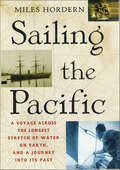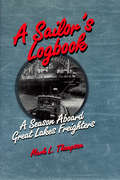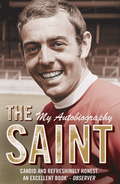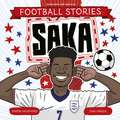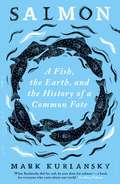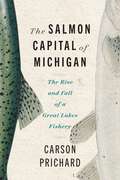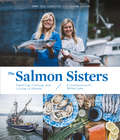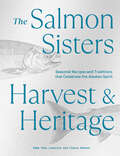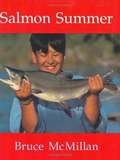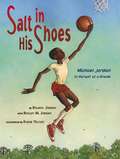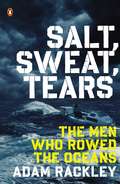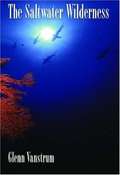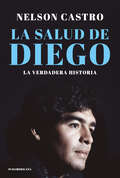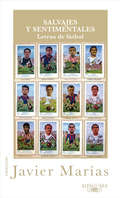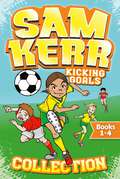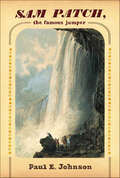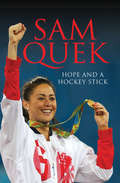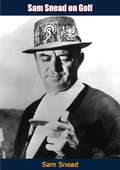- Table View
- List View
Sailing the Pacific: A Voyage Across the Longest Stretch of Water on Earth, and a Journey into Its Past
by Miles HordernSolo sailors are widely known to be a breed apart, and here's an unforgettable book that shows just how wide a berth they give themselves from the crowds. Several years ago, Miles Hordern, a schoolteacher by training---though he had run away to sea a few times before---set sail on a twenty-eight-foot boat from New Zealand to South America, the largest uninterrupted stretch of water on earth, and into the dominion of icebergs, cyclones, and swells of monumental proportions. The trip would take him through the fjords of Patagonia, one of the last uncharted areas in the world, then north on the Peru Current before he began his homeward voyage.Sailing the Pacific recounts that trip in prose so vivid you can almost feel the spray sting your face and the deck heave beneath your feet. Here is prose so hawser-taut that it takes you back to Conrad, Melville, and Poe, indeed all those writers whose works about the bounding main have launched countless imaginations. Hordern pauses to consider those who have gone before him, recounting the stories that have given life to this lonely and magisterial part of the world. Writers, adventurers, fictional characters, cartographers, doomed voyages from history's pages—from the Whaleship S.S. Essex to the HMS Bounty: the South Pacific drew them all, and in their way they left mark on its vast surface.Part sailing yarn, part adventure story, part homage to an unending but beckoning horizon, Sailing the Pacific will appeal to the sailor in each one of us, whatever the way we choose to answer the ocean's call.
A Sailor's Logbook: A Season Aboard Great Lakes Freighters
by Mark L. ThompsonIn this firsthand account of life aboard the ships of the Great Lakes, Mark Thompson weaves together the threads of a story that relives a centuries-old tradition. Thompson began his logbook after he reported for duty aboard the Calcite II at Fraser Shipyard in Superior, Wisconsin, for the 1996 shipping season. A Sailor's Logbook is the first such book to chronicle a sailor's life at the end of the twentieth century. Not just a detailing of weather, cargo, and crew relations, A Sailor's Logbook is also an account of the daily lives of a diverse group of crewmembers as they share their sailing knowledge, "sea stories," and the many memories that accompany the pictures. Although there are ample resources in museums, archival collections, and company files regarding statistical logbook information, A Sailor's Logbook details the intricacies of daily life on a Great Lakes freighter. Thompson navigates the reader through the waters of the Great Lakes and his own life in this very special narrative.
The Saint - My Autobiography: The man, the myth, the true story
by Ian St JohnThis is the life story of the legendary Liverpool and Scotland 1960s footballer known as 'The Saint'. Bought by Bill Shankly from Motherwell in 1961, Ian St John was widely thought of as one of the most significant signings ever made by Liverpool FC, and was a key component in Shankly's first successful team. In his autobiography, he reveals how it felt to play for one of the most successful clubs in Britain, and to be part of one of the greatest moments in the club's history; winning the FA Cup in 1965 after 70 years of trying. In the final against Leeds, Ian was to score the winning goal in extra time.However, after the glory would come pain and frustration, as after serving ten years with Liverpool, he was dropped from the team without warning. Here he describes his anger at the betrayal he felt from Bill Shankly, the legendary master of Anfield, and provides an insight into the character of one of Britain's greatest managers. He reveals how his life after Liverpool has been no less uneventful; his playing days in South Africa, career in management and television days with Jimmy Greaves are also explored at length. From this rich mix of football and life, Ian St John tells the compelling story of his journey through a game which has changed, he says, almost beyond belief.
The Saint - My Autobiography: The man, the myth, the true story
by Ian St JohnThis is the life story of the legendary Liverpool and Scotland 1960s footballer known as 'The Saint'. Bought by Bill Shankly from Motherwell in 1961, Ian St John was widely thought of as one of the most significant signings ever made by Liverpool FC, and was a key component in Shankly's first successful team. In his autobiography, he reveals how it felt to play for one of the most successful clubs in Britain, and to be part of one of the greatest moments in the club's history; winning the FA Cup in 1965 after 70 years of trying. In the final against Leeds, Ian was to score the winning goal in extra time.However, after the glory would come pain and frustration, as after serving ten years with Liverpool, he was dropped from the team without warning. Here he describes his anger at the betrayal he felt from Bill Shankly, the legendary master of Anfield, and provides an insight into the character of one of Britain's greatest managers. He reveals how his life after Liverpool has been no less uneventful; his playing days in South Africa, career in management and television days with Jimmy Greaves are also explored at length. From this rich mix of football and life, Ian St John tells the compelling story of his journey through a game which has changed, he says, almost beyond belief.
Saka (Football Stories #7)
by Simon MugfordIn Football Stories: Saka, young readers can discover the complete journey of Bukayo Saka from a little kid with big dreams to one of the giants of football. With simple text and engaging art, this fully illustrated picture book is the ideal first read for little football fans. They'll love Saka's story, especially when they learn that once he was just a football-loving kid just like them.
Salmon: A Fish, the Earth, and the History of a Common Fate
by Mark KurlanskyMost of what we do on land ends up impacting the ocean, but never is that clearer than when we look at salmon. Centuries of our greatest assaults on nature, from overfishing to dams, from hatcheries to fish farms, from industrial pollution to the ravages of climate change, can be seen in their harrowing yet awe-inspiring life cycle. From the Pacific to the Atlantic, through Scotland, Ireland, Norway, Iceland, Japan and Siberia, Mark Kurlansky traces the history of the world through his fish-eye lens, laying bare our misdirected attempts to manipulate salmon for our own benefit. Attempts that have had a devastating impact on both fish and earth. Now, the only way to save salmon is to save the planet, and the only way to save the planet may be to save the salmon.
The Salmon Capital of Michigan: The Rise and Fall of a Great Lakes Fishery (Great Lakes Books Series)
by Carson PrichardWeaving together the stories and voices of residents, anglers, community leaders, and environmental workers and researchers, this ethnographic account details the lives and livelihoods impacted by a once-unrivaled Michigan salmon fishery. From the introduction of Chinook salmon to the Great Lakes in the late 1960s, a thriving recreational fishery industry arose in Northern Michigan, attracting thousands of anglers to small towns like Rogers City each week at its peak. By the early 2000s, a crisis loomed beneath the surface of Lake Huron as the population of a prey fish species called alewife unexpectedly collapsed, depleting the salmon’s main source of food. By 2007, the salmon population had collapsed too, leaving local fisheries and their respective communities lacking a key commodity and a bid on fishery tourism. Author, angler, and ecologist Carson Prichard artfully incorporates fisheries science and local news media into an oral history that is entertaining, rich, and genuine. Complementing an ecological understanding of events, this narrative details the significance of the fishery and its loss as experienced by the townspeople whose lives it touched.
The Salmon Sisters: Feasting, Fishing, and Living in Alaska
by Emma Teal Laukitis Claire NeatonThe bright and inspiring life and work story from a pair of sisters who are Alaskan fisherwomen, along with fifty hearty and comforting recipes that honor wild foods from the sea and the shore.Share in the remarkable and wild lives of Emma Teal Laukitis and Claire Neaton, the Salmon Sisters, who grew up on a homestead in the Aleutians where the family ran a commercial fishing boat in the Alaskan sea. Their book reveals this outward-bound lifestyle of natural bounty, the honest work on a boat's deck, and the wholesome food that comes from local waters and land. Here are creative and simple ways to enjoy wild salmon, halibut, and spot prawns. The sisters are committed to sustaining and celebrating the seafaring community in Alaska, and their business of selling products related to and from the ocean donates a can of wild-caught fish to local food banks for each item purchased.
The Salmon Sisters: Seasonal Recipes and Traditions that Celebrate the Alaskan Spirit
by Emma Teal Laukitis Claire NeatonFollow the Salmon Sisters as they celebrate the seasons through the food, traditions, and rituals of their Alaskan home. Lush photography, charming illustrations, 60 comforting recipes, and 35 traditions showcase and honor the untamed spirit, natural bounty, and seasonal rhythms of land and sea.Open up the rich pages of Harvest & Heritage and step into another world. A landscape dotted with berries, wildflowers, and moose, an ocean rich with salmon, seafood, and kelp. A place of resilience and cherished traditions. While the landscape is vast, the community is tight-knit. This is the world of the Salmon Sisters and they are inviting you to join them through a year of changing seasons and comforting rituals. And yes, deeply satisfying food.The cookbook is organized by season. In each section, readers will find: Recipes ideal for the home cookIllustrated rituals and traditionsStories from Alaskan women on living and eating well A Solstice or Equinox menu to celebrate the seasonal harvestExpansive and intimate photography The recipes and projects are delicious and satisfying. For example, forage spruce tips and make Spruce Tip Ice Cream. Jig for a halibut and then make Halibut Burgers with Wild Chimichurri. Emma Teal Laukitis and Claire Neaton, aka the Salmon Sisters, grew up on a homestead in Alaska's remote Aleutian Islands, and they make their livelihood harvesting wild seafood from the pristine, bountiful waters around them. This luxe hardcover reflects their values and vision, with delicious recipes and lovely traditions that is seasonal eating and living at its best.
Salmon Summer
by Bruce McmillanA photo essay describing a young Native Alaska boy fishing for salmon on Kodiak Island as his ancestors have done for generations.
Salt In His Shoes: Michael Jordan In Pursuit Of A Dream
by Deloris Jordan Roslyn M. Jordan Kadir NelsonMichael Jordan. The mere mention of the name conjures up visions of basketball played at its absolute best. But as a child, Michael almost gave up on his hoop dreams, all because he feared he'd never grow tall enough to play the game that would one day make him famous. That's when his mother and father stepped in and shared the invaluable lesson of what really goes into the making of a champion -- patience, determination, and hard work. Deloris Jordan, mother of the basketball phenomenon, teams up with his sister Roslyn to tell this heartwarming and inspirational story that only the members of the Jordan family could tell. It's a tale about faith and hope and how any family working together can help a child make his or her dreams come true. Image descriptions present.
Salt & Silver: Travel, Surf, Cook
by Johannes RiffelmacherTwo surfers look for Latin America’s best waves—and best food: “Part travelogue, part cookbook, and all outstanding . . . an epic trip that’s well worth taking.” —Publishers Weekly (starred review)This book traces the journey of surfers Johannes Riffelmacher and Thomas Kosikowski as they make their way through Central and South America—reporting on the best surfing locations, chronicling the stories of local surfers and restaurant owners, and compiling recipes representative of each area. The narrative begins in Cuba with beautiful images of the city and the beaches, as well as stories related to the Cuban surfing community and a discussion of popular Cuban dishes. Next is a tour of Mexico—first with street tacos, a trip through Mexican markets, and a day spent in the urban graffiti scene of Guadalajara; then with Tostadas de Pulpo (Octopus Crackers), Shrimp and Portobello Burgers, and a glimpse into life in the remote surfing town of San Pancho. The Mexican leg of the journey draws to a conclusion with seven-meter-waves, BBQ, and Tajine in Rio Nexpa, as well as “a perfect righthander barreling of a point” in scenic La Ticla. Then the two men make their way through Nicaragua, Costa Rica, Panama, Ecuador, Peru, and finally Chile, exploring the beaches as well as the kitchens of each location. Interspersed throughout are more than ninety regional recipes, over 250 stunning photographs, and a wide array of tips and stories ranging from social commentary to pointers on how to rent a “Hamaquera” in La Ticla for three dollars a night.“The recipes . . . are real-deal, the photography is breathtaking, and the tales of full immersion are inspiring.” —Nick McGregor, Eastern Surf Magazine
Salt, Sweat, Tears
by Adam RackleyThe true-life adventure of two men who rowed across the Atlantic Ocean and the history of those who came beforeMore people have climbed Mount Everest than have rowed across the Atlantic. For more than seventy days, Adam Rackley and his rowing partner ate, slept and rowed in a boat seven meters long by two meters wide, in one of the world's most extreme environments. This is his story of adventure, endurance, and self-discovery.They were following in the wake of pioneers. In 1896 George Harbo and Frank Samuelsen, a pair of Norwegian fisherman, crossed the 2,500 miles in a wooden fishing dory--and their record stood for 114 years. John Fairfax, a smuggler, a gambler, and a shark hunter, was the first to complete the feat singlehandedly in 1969. Others have followed; some have not survived the attempt. This is their story, too.
Salto De Fe
by Ed Robinson Paula De MonteMuchos sueñan con vender todo lo que tienen, renunciar al trabajo y huir al Paraíso. Esta es la historia de una pareja que hizo ese sueño realidad. El autor comparte lo que se siente al experimentar la máxima libertad, y describe los pasos que tuvieron que dar para llegar hasta allí. La historia incluye relatos de sus viajes, comentarios sociales acerca del estado de la sociedad estadounidense de nuestros días, y un simple plan financiero que podrá beneficiar a cualquier persona, independientemente de sus metas para el futuro. A lo largo de la narración, se invita al lector a conocer los delfines y los manatís, los pelícanos y las águilas pescadoras, el cielo azul, el agua azul y las playas de arena blanca. La música tropical también aparece en escena. Lea acerca de cómo la música los inspiró a llevar a cabo su plan. Siga la historia a medida que se transforman de esclavos laborales rutinarios a vagabundos de botes y playas libres de preocupaciones. Este libro lo hará volver a pensar en su modo de ver la vida y el dinero.
Salto De Fé - Largue Seu Emprego E Vá Morar Num Barco
by Ed Robinson Makoto YamamotoHá muitos de nós que sonham em vender todas nossas coisas, deixar o emprego e fugir para o Paraíso. Esta é uma história de um casal que fez esse sonho virar realidade. O autor compartilha o que sentiu ao experimentar sua liberdade final, e descreve os passos que tomou para chegar lá. A história inclui contos de suas viagens, comentários sobre o estado da sociedade americana de hoje e um plano financeiro simples que beneficiará qualquer pessoa, independentemente de seus objetivos futuros. Ao longo da narrativa, o leitor é presenteado com golfinhos e peixes-boi, pelicanos e águias-pescadoras, céu azul, água cristalina e praias de areia branca. A música tropical desempenha um papel importante também. Saiba como a música os inspirou a executar este plano. Acompanhe como eles transformam um cotidiano de trabalho entediante em uma rotina de vagabundos despreocupados a bordo de um barco. Este livro fará você repensar a forma como encara a vida e o dinheiro.
Saltwater Buddha
by Jaimal YogisFed up with teenage life in the suburbs, Jaimal Yogis ran off to Hawaii with little more than a copy of Hermann Hesse's Siddhartha and enough cash for a surfboard. His journey is a coming-of-age saga that takes him from communes to monasteries, from the warm Pacific to the icy New York shore. Equal parts spiritual memoir and surfer's tale, this is a chronicle of finding meditative focus in the barrel of a wave and eternal truth in the great salty blue.
Saltwater Buddha: A Surfer's Quest to Find Zen on the Sea
by Jaimal YogisFed up with his suburban teenage life, at age sixteen, Jaimal Yogis ran off to Hawaii with little more than a copy of Hermann Hesse's Siddhartha and enough cash for a surfboard.
The Saltwater Wilderness
by Glenn S. VanstrumThis book plunges the reader into the heart of the sea. It provides an account of one photojournalist's experience studying marine natural history and ecology. Illustrated with black and white photography, and annotated with references to classic marine literature, this book takes the reader from California to New Guinea, Fiji, Palau, and Tonga, to the Caribbean, to Alaska, and back again. Along the way, a quest to shed light on marine limits, symbiosis, and biogeography ties the adventures together. It will appeal to anyone who snokels, swims, scuba dives, surfs, studies marine biology, or loves the sea.
La salud de Diego. La verdadera historia
by Nelson CastroDe las rutinas de un atleta a las adicciones y la muerte del mayor jugador de fútbol de todos los tiempos. Diego Armando Maradona ya era un adicto cuando millones quedaron atónitos ante aquel gol inigualable contra los ingleses durante el Mundial 86. A partir de entonces, a las drogas se sumaron el alcohol, la adicción al sexo y el descontrol alimentario. Esos consumos terminarían por acorralarlo en un cuarto sórdido del Gran Buenos Aires. Junto con los días oscuros que precedieron su muerte, ocurrida el 25 de noviembre de 2020, la vida completa del ídolo volvió a ser revisada y juzgada. Sin embargo, hay una historia que nadie contó hasta ahora: la de su cuerpo. Desde las primeras lesiones óseas y musculares de Fiorito hasta las extenuantes campañas deportivas en Europa; desde su fenomenal fortaleza muscular hasta el dolor físico y anímico al que intentó sobreponerse dentro y fuera de la cancha. Para escribir La salud de Diego, Nelson Castro accedió a archivos secretos, entrevistó a testigos que nunca habían hablado y revisó miles de documentos inéditos. El resultado excede por mucho el ya impresionante historial médico. Este libro excepcional es, antes que nada, el relato impactante de una caída vertiginosa y triste: la biografía íntima y trágica de un ser humano con dones extraordinarios. «Aunque todo lo escrito aquí es real, la historia que está a punto de comenzar tiene ribetes novelescos y, por momentos, supera cualquier ficción imaginable», dice Nelson Castro, periodista y médico graduado con honores en la Universidad de Buenos Aires.
Salute
by C. W. AndersonFrom the Book jacket: "If I only knew someone who would give him a good home." The owner of a fine horse, just crippled on the track, made the remark and Peter overheard him. Peter was ten and his father had taken him to his first race at Saratoga. He had always loved horses-Mohawk's owner could tell that from the way he acted. Could he take the horse? His father said he could, so a few days later Mohawk came home. Happy, busy days followed for both Peter and Mohawk, for no horse ever received more tender care. He grew strong and lively too. And when another year came around, he ran again and won $500. Perhaps you can guess what Peter did with his money. ... He bought a yearling, and, most exciting of all, Salute was a grandson of the great Man o' War. The artist's beautiful lithographs were all drawn directly on the zinc plates, a technique which gives them a rich depth in tone and quality. C. W. ANDERSON "Young horse lovers are extremely fond of C. W. Anderson's books. They have handsome horse portraits, and they tell in simple, straightforward fashion of the experience of children with horses." -New York Herald Tribune C. W. Anderson grew up in Wahoo, Nebraska, and studied at the Art Institute of Chicago. His first book, Billy and Blaze, was published by Macmillan in 1936. Since then more than half a million Billy and Blaze Books have been sold, and Mr. Anderson has come to be recognized as America's foremost author- illustrator of horse stories. He has written such favorites for young readers as A Filly for Joan and High Courage, as well as books for horse enthusiasts of all ages such as Heads Up, Heels Down, C. W. Anderson's Complete Book of Horses and Horsemanship, and Twenty Gallant Horses. Horses still dominate Mr. Anderson's life as an artist and sportsman. He has a country home in Mason, New Hampshire, where he rides, and a studio in Boston.
Salvajes y sentimentales: Letras de fútbol
by Javier Marías«En ningún otro libro de fútbol se encontrarían análisis tan inteligentes y conmovedores.»Stuttgarter Zeitung La supuesta incompatibilidad entre las letras y el fútbol ya fue desmentida por algunos clásicos modernos: tanto Nabokov como Camus ocuparon puesto de portero en sus respectivas juventudes, y el segundo dijo que cuanto de importante sabía acerca de la moral humana lo había aprendido en el fútbol. A ellos se une el novelista Javier Marías (que fue extremo izquierdo en la infancia) con esta colección de piezas futbolísticas en las que tampoco la moral está ausente. Escribir de este deporte es para él «un descanso». Para Marías el fútbol es la «recuperación semanal de la infancia»; y también es temor y temblor, dramaticidad y zozobra , una mezcla de sentimentalidad y salvajismo, una escuela de comportamiento y nostalgia, y la escenificación de la épica al alcance de todo el mundo. En este libro, que incorpora treinta nuevos textos, se habla de jugadores y aficionados, entrenadores y presidentes, derrotas y triunfos, de emoción y vergüenza; también del carácter casi cinematográfico de este deporte, de la cuidadosa memoria y el rápido olvido, del patriotismo, la celebración de los goles, los himnos, los andares y gestos llenos de significado. Y vemos el fútbol como lo que seguramente es, en el fondo, para millones de aficionados: un interminable desfile de héroes, villanos, figurantes y gestas, un espectáculo que quizá merece la pena tomarse en serio. La crítica ha dicho...«Marías es aquí conciso, rápido, tan beligerante como ingenioso, autobiográfico sin reservas, y rastrea su tema con pasión y coraje.»Neue Zürcher Zeitung «Como viejo aficionado al fútbol, incluso cuando no estaba de moda entre la intelligentsia, yo le agradezco a Javier Marías este libro que ha reavivado mis recuerdos.»Miguel García-Posada, El País «Las ponderadas e ingeniosas "letras de fútbol" de Marías son puro placer tanto para los aficionados al fútbol como para los interesados en la literatura.»Die Weltwoche «Las breves piezas futbolísticas de Javier Marías resultan poéticas y rebosan de pasión contenida.»Freitag «Pura y dulce nostalgia.»Die Zeit
Sam Kerr Kicking Goals Collection (Sam Kerr: Kicking Goals #7)
by Sam KerrSam Kerr hasn&’t always been a soccer legend. She was an Aussie Rules tragic through and through. But when excluded from her team for being a girl, she has to change direction. Her best friends Dylan and Indi reckon she should flip from AFL to soccer but with the pressure of learning the new rules, and the school bully Chelsa on her case, Sam has to learn fast! The Kicking Goals bumper collection includes the first four exciting stories in this awesome series. It follows Sam&’s journey from soccer newbie to playing in the finals! Inside you&’ll find The Flip Out, A New Knight, Sports Day and Finals Fever.
Sam Patch, the Famous Jumper
by Paul E. JohnsonThe true history of a legendary American folk heroIn the 1820s, a fellow named Sam Patch grew up in Pawtucket, Rhode Island, working there (when he wasn't drinking) as a mill hand for one of America's new textile companies. Sam made a name for himself one day by jumping seventy feet into the tumultuous waters below Pawtucket Falls. When in 1827 he repeated the stunt in Paterson, New Jersey, another mill town, an even larger audience gathered to cheer on the daredevil they would call the "Jersey Jumper." Inevitably, he went to Niagara Falls, where in 1829 he jumped not once but twice in front of thousands who had paid for a good view.The distinguished social historian Paul E. Johnson gives this deceptively simple story all its deserved richness, revealing in its characters and social settings a virtual microcosm of Jacksonian America. He also relates the real jumper to the mythic Sam Patch who turned up as a daring moral hero in the works of Hawthorne and Melville, in London plays and pantomimes, and in the spotlight with Davy Crockett—a Sam Patch who became the namesake of Andrew Jackson's favorite horse.In his shrewd and powerful analysis, Johnson casts new light on aspects of American society that we may have overlooked or underestimated. This is innovative American history at its best.
Sam Quek: Hope and a Hockey Stick
by Sam QuekSam Quek is mainly known for her starring role in the 2016 Olympic gold medal winning hockey team. This was the first time a British ladies team had won gold, but what is much less known is that Sams rise to the top of her spot was far from easy.Sam missed out on being part of Team GB at the London 2012 Olympics but competed for England at the 2013 EuroHockey tournament and 2014 Commonwealth Games, which she won silver medals. She won the gold at the 2016 Rio Olympics after the GB hockey team beat the Netherlands on penalties.How Sam overcame the bitter disappointment of being overlooked for the two previous Olympics and ensured that she wouldnt miss out again are revealed here for the first time. She also tells of her tough childhood and her battle to reach the heights that she has.She then went on to further fame by appearing in Im a Celebrity where she proved to be hugely popular with the viewing public, eventually finishing fourth.Sam now presents a variety of sports for TV, including men and womens football, NFL and hockey. She has been signed up to be the main presenter for the womens World Hockey Championships in 2018, held in August.She is hugely popular on social media with thousands of followers on twitter and instagram. Sam also has some very strong views on how women are portrayed in sport and their treatment by both coaches and the media. This is a hugely topical subject at the moment and promises to remain so for some time.
Sam Snead on Golf
by Sam SneadEver since Sam Snead was a kid, swishing a hickory stick at acorns, he has been talking about golf the way he plays it…in a natural, easy-going style.Now—the fabulous “Slammin’” Sam Snead demonstrates through word and picture, how you can swing into a relaxed game, lower scores and play better golf.Sam Snead is known as the golfer with the greatest swing in the history of the game. Here, his famous swing is captured in a series of action photos that give you a close-up look at each important motion.All of the difficulties suffered by the “weekend golfer”—erratic putting, poor chip shots, topped shots, shanking, weak pitch shots—are analyzed by Snead from fault to cause to cure. He explains what is wrong, why it happens and how you can correct it. Your game is bound to improve once you “blueprint” your mistakes the Sam Snead way.
